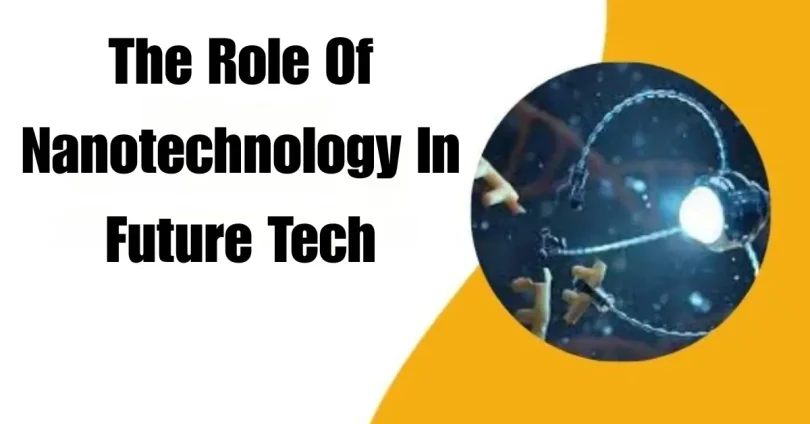Nanotechnology, which involves the manipulation of matter at the nanoscale (1 to 100 nanometers), is rapidly emerging as a transformative force in various technological sectors. The role of nanotechnology in future tech promises to shape the world in profound ways, influencing everything from healthcare and electronics to energy systems and materials science.
This article explores how nanotechnology will revolutionize the technologies of tomorrow, making industries more efficient, sustainable, and accessible.
1. The Role of Nanotechnology in Future Tech: Healthcare Innovation
 One of the most exciting and impactful areas where the role of nanotechnology in future tech will be felt is in healthcare. By harnessing the unique properties of nanoscale materials, nanotechnology is poised to redefine the way we approach disease diagnosis, treatment, and prevention.
One of the most exciting and impactful areas where the role of nanotechnology in future tech will be felt is in healthcare. By harnessing the unique properties of nanoscale materials, nanotechnology is poised to redefine the way we approach disease diagnosis, treatment, and prevention.
- Targeted Drug Delivery: Nanotechnology will enable drugs to be delivered directly to specific cells or tissues in the body, significantly improving the efficiency and reducing the side effects of treatments. For example, in cancer treatment, nanoparticles could be designed to target only cancerous cells, sparing healthy tissue from the toxic effects of chemotherapy.
- Diagnostics and Early Detection: Nanotechnology is expected to revolutionize diagnostic tools, allowing for earlier detection of diseases. Nanosensors can detect disease markers at incredibly low concentrations, making it possible to identify conditions like cancer, diabetes, and cardiovascular diseases much earlier than current methods allow.
- Nanomedicine and Cellular Repair: The role of nanotechnology in future tech also extends to nanomedicine, where tiny nanobots could perform medical tasks at the cellular level, such as repairing damaged tissues or delivering precise medical treatments. This will open new doors in regenerative medicine and organ repair.
- Personalized Medicine: Nanotechnology will help enable more personalized healthcare, where treatments are tailored to the genetic makeup of individuals. By targeting molecular and genetic signatures, therapies can be more effective, with fewer side effects.
2. The Role of Nanotechnology in Future Tech: Electronics and Computing
The integration of nanotechnology in future tech is poised to change the landscape of electronics, computing, and digital devices. The ability to manipulate materials at the nanoscale offers new possibilities for creating more powerful, compact, and energy-efficient devices.
- Smaller and Faster Processors: Nanotechnology allows for the creation of smaller transistors, which are crucial for faster and more efficient processors. As the role of nanotechnology in future tech progresses, materials like carbon nanotubes and quantum dots are being explored to replace traditional silicon-based semiconductors, resulting in faster processing speeds and smaller, more powerful devices.
- Flexible and Wearable Electronics: One of the most promising applications of nanotechnology in electronics is the development of flexible, lightweight, and durable materials. This can lead to innovations like bendable smartphones, stretchable electronics, and wearable devices that can monitor health and provide real-time feedback.
- Quantum Computing: As quantum computing becomes more practical, the role of nanotechnology in future tech will become critical. Nanomaterials are essential for creating stable qubits, the building blocks of quantum computers. These ultra-powerful machines will be able to solve complex problems at speeds that classical computers cannot match, potentially transforming industries like cryptography, artificial intelligence, and drug discovery.
- Improved Batteries and Energy Storage: Nanotechnology in future tech will also revolutionize energy storage systems. Nanomaterials can significantly increase the energy density of batteries, making them smaller, lighter, and capable of holding more energy. This will improve the performance of everything from electric vehicles to consumer electronics.
You may also like to read this:
How Quantum Computing Will Change The World?: A Guide
What Is The Future Of AI And Machine Learning? In 2025?
Next-Gen AI Developments: Trends To Watch In 2025
The Latest Innovations In Technology Shaping Healthcare
Future Tech Trends 2024: Key Advancements Expected
Top Best Future Tech Gadgets To Watch In 2024 You Need
How AI Is Shaping The Future Workforce? In 2025
3. The Role of Nanotechnology in Future Tech: Sustainable Energy Solutions
The global shift towards sustainable energy sources will rely heavily on the role of nanotechnology in future tech. Nanotechnology promises to enhance renewable energy production, improve energy storage, and contribute to more efficient energy use, making it a key player in combating climate change.
- Solar Energy Efficiency: Nanotechnology will play a major role in enhancing solar energy technologies. By improving the efficiency of solar panels through the use of nanomaterials like perovskite solar cells and nanostructured coatings, the role of nanotechnology in future tech will make solar energy more affordable and widely accessible.
- Energy Harvesting: Nanomaterials can also be used to capture and store energy from various sources, such as heat, light, and mechanical vibrations. These innovations could lead to smaller, more efficient devices that gather energy from everyday activities, helping power low-energy devices without the need for conventional batteries.
- Carbon Capture and Environmental Remediation: The role of nanotechnology in future tech extends to environmental sustainability. Nanomaterials can be used to capture carbon dioxide from the atmosphere, mitigating the effects of climate change. Additionally, nanotechnology can help purify water, reduce pollution, and enhance waste management systems.
- Improved Energy Storage Devices: Nanotechnology will improve energy storage devices such as batteries and supercapacitors. Nanomaterials can help increase the capacity, reduce the weight, and speed up the charging times of these devices, leading to significant improvements in energy storage for electric vehicles, mobile devices, and large-scale energy grids.
4. The Role of Nanotechnology in Future Tech: Advanced Materials
 Materials science is another area where the role of nanotechnology in future tech will have a profound impact. By manipulating materials at the nanoscale, engineers will be able to create materials with unique properties that are not possible with traditional methods.
Materials science is another area where the role of nanotechnology in future tech will have a profound impact. By manipulating materials at the nanoscale, engineers will be able to create materials with unique properties that are not possible with traditional methods.
- Stronger, Lighter, and More Durable Materials: Nanomaterials like carbon nanotubes and graphene are incredibly strong, lightweight, and conductive, which makes them ideal for use in industries ranging from aerospace to construction. The role of nanotechnology in future tech will enable the creation of lighter, stronger materials that could revolutionize transportation, construction, and manufacturing.
- Self-Healing Materials: In the future, we may see materials that can heal themselves when damaged. By using nanotechnology, scientists are developing materials that can repair themselves after cracks or breaks, leading to longer-lasting products in industries like electronics, automotive, and infrastructure.
- Smart Materials: Nanotechnology in future tech will also enable the development of smart materials that can respond to external stimuli, such as changes in temperature, pressure, or light. These materials could be used in applications ranging from adaptive clothing to self-adjusting windows and advanced sensors.
5. Ethical and Safety Considerations: The Role of Nanotechnology in Future Tech
Despite the immense promise of nanotechnology in future tech, there are significant challenges and ethical considerations that must be addressed. As nanotechnology is integrated into more consumer products, it is important to consider its impact on health, safety, and society.
- Health and Environmental Safety: As the use of nanomaterials becomes more widespread, understanding the potential risks to human health and the environment is essential. Research into the toxicity and long-term effects of nanomaterials is crucial to ensuring their safe use in consumer products, medical treatments, and environmental applications.
- Privacy and Surveillance: As the role of nanotechnology in future tech expands, concerns about privacy and security will increase. The miniaturization of devices enabled by nanotechnology could lead to new forms of surveillance, potentially infringing on individual privacy. Ethical guidelines and regulations will be necessary to protect personal freedoms.
- Social and Economic Equity: Access to nanotechnology could create disparities between regions and socioeconomic groups. Ensuring that the benefits of nanotechnology are distributed equitably will be a critical challenge for policymakers and stakeholders as these technologies advance.
- Regulation and Oversight: The rapid development of nanotechnology will require new regulatory frameworks to ensure that nanomaterials are used safely and responsibly. Governments and international organizations will need to work together to establish standards for the production, use, and disposal of nanomaterials.
Conclusion
The role of nanotechnology in future tech is nothing short of revolutionary. As this technology continues to evolve, it will shape nearly every aspect of our lives, from healthcare and energy to electronics and materials science. Nanotechnology’s ability to create new, efficient, and sustainable solutions to global challenges makes it a cornerstone of the technologies that will define the future.
However, careful consideration of safety, ethics, and regulation will be essential to ensure that these innovations benefit society as a whole. As we continue to unlock the potential of nanotechnology, its impact on future tech will be one of the defining factors of our technological future.
FAQs
1. What is nanotechnology?
Nanotechnology involves manipulating matter at the nanoscale (1–100 nm) to create materials and devices with unique properties not found in larger-scale materials.
2. How does nanotechnology impact future technology?
The role of nanotechnology in future tech is transformative, enhancing performance, efficiency, and sustainability in fields like healthcare, electronics, energy, and materials science.
3. What are some healthcare applications of nanotechnology?
Nanotechnology enables:
Targeted drug delivery to diseased cells.
Early disease detection through nanosensors.
Regenerative medicine for tissue repair.
Personalized treatments based on genetic information.
4. How does nanotechnology benefit electronics?
Nanotechnology contributes by creating:
Smaller, faster processors.
Flexible, wearable electronics.
Quantum computing advancements.
Improved batteries for longer-lasting energy storage.
5. How does nanotechnology improve energy systems?
Nanotechnology enhances:
Solar energy efficiency with advanced materials.
Energy harvesting from light and vibrations.
Carbon capture to reduce CO2 emissions.
Better energy storage with lightweight, high-capacity batteries.








